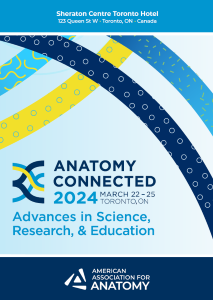Anatomy Education Posters
Poster: Anatomy Education Posters
94 - Gross Anatomy Teaching Assistant Training for Improved Self-efficacy in a Doctor of Physical Therapy Program
Sunday, March 24, 2024
5:00pm - 7:00pm US EDT
Location: Sheraton Hall
Poster Board Number: 94
There are separate poster presentation times for odd and even posters.
Odd poster #s – first hour
Even poster #s – second hour
Co-authors:
There are separate poster presentation times for odd and even posters.
Odd poster #s – first hour
Even poster #s – second hour
Co-authors:
Adam Buckman, SPT - University of Central Arkansas; Madison Herbert, SPT - University of Central Arkansas; Walter Reed, SPT - University of Central Arkansas; Lara Davis, PT, PhD - Assistant Professor, Physical Therapy, University of Central Arkansas
- SH
Samantha Herrington, SPT
University of Central Arkansas
Conway, Arkansas, United States
Presenting Author(s)
Abstract Body : Introduction and Objective
Teaching assistants (TAs) are an important part of many gross anatomy courses to improve student to instructor ratios. Evidence-based teaching practices have been heavily researched in the realm of education and several have been shown to improve student and educator performance and self-efficacy in various educational settings. Despite the available evidence to support the effectiveness of implementing these teaching practices in other educational settings, research pertaining to pedagogical training for gross anatomy TAs in a doctor of physical therapy (DPT) program is lacking. The aim of this study was to determine how intentional training through modules of evidence-based teaching practices affect teaching assistant-perceived effectiveness and self-efficacy in a DPT gross anatomy lab setting.
Materials and Methods
The study was completed at a public higher education institution. Second-year DPT student TAs completed a modified version of the Teachers’ Sense of Efficacy Scale pre- and post-training along with open-ended questions to assess change in their self-reported confidence and retention of module concepts. Training modules for TAs included giving constructive feedback, spaced and massed practice, dual coding, retrieval practice, elaboration, interleaving, metacognition, and diversity in anatomy education.
Results
A total of eight anatomy lab TAs, five female, three male, participated in this study. All participants reported increased self-efficacy in student engagement and instructional strategies, as well as overall confidence. Teaching strategies of dual coding, spaced and massed practice, and retrieval practice were more often recalled by TAs after implementation of all training modules.
Conclusion
Implementation of TA training modules for a graduate program gross anatomy lab may improve TA self-efficacy and confidence.
Significance/Implication
TAs are an invaluable resource in a gross anatomy lab course, and the activities they create and lead are helpful for first-year DPT students when navigating a challenging anatomy course. Though this study showed increases in TA self-efficacy after implementation of training modules, future studies should investigate the impact of DPT TA training modules on these students’ confidence in teaching and learning strategies for future coursework and clinical education experiences.
Teaching assistants (TAs) are an important part of many gross anatomy courses to improve student to instructor ratios. Evidence-based teaching practices have been heavily researched in the realm of education and several have been shown to improve student and educator performance and self-efficacy in various educational settings. Despite the available evidence to support the effectiveness of implementing these teaching practices in other educational settings, research pertaining to pedagogical training for gross anatomy TAs in a doctor of physical therapy (DPT) program is lacking. The aim of this study was to determine how intentional training through modules of evidence-based teaching practices affect teaching assistant-perceived effectiveness and self-efficacy in a DPT gross anatomy lab setting.
Materials and Methods
The study was completed at a public higher education institution. Second-year DPT student TAs completed a modified version of the Teachers’ Sense of Efficacy Scale pre- and post-training along with open-ended questions to assess change in their self-reported confidence and retention of module concepts. Training modules for TAs included giving constructive feedback, spaced and massed practice, dual coding, retrieval practice, elaboration, interleaving, metacognition, and diversity in anatomy education.
Results
A total of eight anatomy lab TAs, five female, three male, participated in this study. All participants reported increased self-efficacy in student engagement and instructional strategies, as well as overall confidence. Teaching strategies of dual coding, spaced and massed practice, and retrieval practice were more often recalled by TAs after implementation of all training modules.
Conclusion
Implementation of TA training modules for a graduate program gross anatomy lab may improve TA self-efficacy and confidence.
Significance/Implication
TAs are an invaluable resource in a gross anatomy lab course, and the activities they create and lead are helpful for first-year DPT students when navigating a challenging anatomy course. Though this study showed increases in TA self-efficacy after implementation of training modules, future studies should investigate the impact of DPT TA training modules on these students’ confidence in teaching and learning strategies for future coursework and clinical education experiences.

